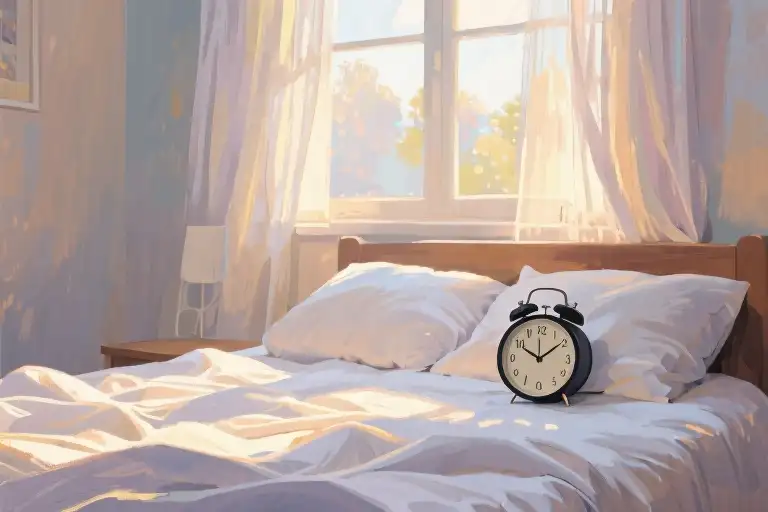You’ve probably set your alarm to get a full 8 hours of sleep, only to find yourself staring at the ceiling at 2 AM. That familiar pang of guilt creeps in – “I’m ruining my health by not hitting that magic number.” But what if we told you that this near-universal health advice might be one of modern wellness’ most persistent myths?
Emerging research is turning our conventional wisdom about sleep duration upside down. A comprehensive global study tracking 4,933 adults across 20 countries reveals a striking reality: only about 5% of people naturally sleep exactly 8 hours, and those who do aren’t necessarily healthier. From Tokyo’s 6-hour-and-18-minute average to Paris’ more leisurely 7 hours and 52 minutes, our sleep patterns vary dramatically based on culture, lifestyle, and individual biology.
This isn’t just about getting less shut-eye. The real revelation? For most adults, sleeping fewer than 8 hours isn’t just normal – it might be optimal. The “8-hour rule” appears to be a historical accident rather than scientific fact, dating back to industrial-era labor movements that championed “8 hours for work, 8 hours for rest, 8 hours for what we will.” Modern sleep science tells a more nuanced story, where quality often trumps quantity, and personal rhythms matter more than arbitrary benchmarks.
Consider these eye-opening findings:
- Japanese adults average just 6h18m nightly, yet Japan boasts one of the world’s highest life expectancies
- French sleep nearly 2 hours longer than their Japanese counterparts without significant health advantages
- Natural short sleepers (those needing <6 hours) show no increased mortality risk when following their biological rhythm
The implications are profound. That anxiety you feel when your sleep tracker shows 6.5 hours? It might be more harmful than the “short” sleep itself. As we’ll explore, determining your optimal sleep duration involves understanding your body’s signals, your cultural context, and cutting-edge research that’s redefining what “good sleep” really means.
The Myth of 8-Hour Sleep: Where Did It Come From?
We’ve all heard it countless times – the golden rule of sleep that dictates we need exactly 8 hours every night to function optimally. This advice has become so ingrained in our collective consciousness that questioning it feels almost heretical. But what if this universally accepted wisdom wasn’t based on scientific evidence at all?
The Industrial Revolution’s Lasting Legacy
The origins of the 8-hour sleep recommendation trace back to an unexpected source – the labor movements of the Industrial Revolution. During this period, workers famously fought for the “8-8-8” principle: 8 hours for work, 8 hours for recreation, and 8 hours for sleep. While this division provided a useful framework for labor rights, it was never intended as a biological prescription for human sleep needs.
As Dr. Matthew Walker, author of Why We Sleep, explains: “The 8-hour standard was born from industrial scheduling needs, not from any understanding of human sleep physiology.” This arbitrary division of time became codified in our cultural understanding of health, despite lacking scientific validation.
What Sleep Research Actually Shows
Modern sleep science reveals a far more nuanced picture. Large-scale clinical studies consistently show that:
- Only about 5% of adults naturally sleep exactly 8 hours per night
- The majority of healthy adults sleep between 6.5 and 7.5 hours
- Sleep needs follow a normal distribution curve, with 7-9 hours encompassing most people’s requirements
A comprehensive review in the Journal of Clinical Sleep Medicine found no evidence that sleeping exactly 8 hours provides health benefits over other durations within the normal range. In fact, insisting on 8 hours when your body needs less can lead to fragmented sleep and increased wakefulness during the night.
The Problem With One-Size-Fits-All Advice
The persistence of the 8-hour myth creates unnecessary anxiety for millions. Many people who feel perfectly rested after 6.5 or 7 hours of sleep worry they’re sleep-deprived because they don’t hit the magical 8-hour mark. This creates a vicious cycle where:
- People spend more time in bed than their bodies need
- They experience more nighttime awakenings
- Sleep quality decreases
- They become convinced they have “sleep problems”
As sleep researcher Dr. Daniel Kripke notes: “The healthiest sleep duration isn’t a fixed number – it’s the amount that leaves you feeling refreshed and alert during the day.” This might be 6 hours for some, 9 for others, with most falling somewhere in between.
Breaking Free From Sleep Dogma
Understanding that the 8-hour rule is more cultural than scientific can be liberating. Instead of fixating on an arbitrary number, we should focus on:
- How we feel during the day
- Our individual sleep patterns
- The quality rather than just quantity of sleep
In our next section, we’ll explore how sleep needs vary dramatically across different cultures – with some surprising findings about which countries get the least (and most) sleep on average.
How Culture Shapes Your Sleep: A Global Perspective
While the 8-hour sleep rule is often presented as universal truth, a fascinating study of 4,933 adults across 20 countries reveals how dramatically sleep patterns vary by culture. The research, published in Nature Human Behaviour, found average sleep duration ranging from just 6 hours 18 minutes in Japan to nearly 8 hours in France (7 hours 52 minutes). This 90-minute global gap proves sleep isn’t one-size-fits-all.
The Sleep Atlas: Country by Country Breakdown
| Country | Avg. Sleep Duration | Cultural Factors |
|---|---|---|
| Japan | 6h 18m | Long work hours, “inemuri” (napping at work) culture |
| France | 7h 52m | Strong work-life balance, late dinners |
| United States | 7h 06m | Early work starts, screen time before bed |
| Spain | 7h 31m | Siesta tradition, shifted circadian rhythms |
| Netherlands | 8h 12m | Early bedtimes, dark winter evenings |
Cultural Sleep Signatures
Japan’s “Sleeping While Present” Paradox
The shortest sleepers globally have perfected the art of “inemuri” – napping openly at work or in public. This culturally accepted microsleep practice compensates for Japan’s demanding work culture and long commutes (average 58 minutes each way). As sleep researcher Dr. Kenichi Ueda notes: “In Japan, sleeping at your desk shows dedication – it means you worked until exhaustion.”
Spain’s Double Sleep Rhythm
The siesta isn’t dead – it’s evolved. Modern Spaniards average just 26-minute daytime naps, but maintain a unique biphasic rhythm with late-night bedtimes (post-11pm dinners are standard). This creates a natural “second wind” of alertness from 8-10pm that’s culturally channeled into socializing.
France’s Sleep Luxury
Topping the charts at nearly 8 hours, the French sleep culture prioritizes rest. Legally mandated 11-hour breaks between shifts, widespread acceptance of long lunch breaks, and cultural resistance to early morning meetings all contribute. “In Paris, scheduling breakfast meetings is social suicide,” laughs expat sleep coach Marie Dubois.
Why Your Sleep Needs Are Culturally Programmed
The groundbreaking conclusion from the 20-country study: “Social norms predict sleep timing better than biological factors.” This explains why:
- Night owls thrive in Spain’s late-night culture
- Japanese workers adapt to minimal sleep through strategic napping
- Scandinavian countries with extreme daylight variations show wider sleep duration ranges
Your ideal sleep duration isn’t just in your genes – it’s in your cultural operating system. Tomorrow’s sleep science won’t ask “How much sleep do you need?” but “What sleep pattern fits your life context?”
Next: How to decode your personal sleep signature beyond cultural influences…
Finding Your Optimal Sleep Duration
Determining your ideal sleep duration isn’t about hitting arbitrary numbers—it’s about listening to your body’s unique needs. While wearable technology and sleep studies provide valuable data, the most accurate assessment comes from combining scientific tools with self-awareness.
Method 1: Leverage Sleep Tracking Technology
Modern wearable devices like WHOOP and Oura rings have revolutionized personal sleep analysis by monitoring:
- Sleep cycles: Tracking time spent in deep, REM, and light sleep stages
- Resting heart rate: Lower nighttime rates typically indicate better recovery
- Heart rate variability (HRV): Higher values correlate with improved sleep quality
Pro tip: Consistent use for 2-3 weeks provides more reliable data than occasional tracking. Look for patterns rather than daily fluctuations.
Method 2: Maintain a Sleep Journal
Complement technological data with old-fashioned observation by recording:
- Morning metrics: Energy levels (1-10 scale), mood, and cognitive clarity
- Daytime alerts: Energy dips, unintentional naps, or caffeine dependence
- Evening signals: Natural drowsiness timing and sleep latency
Sample journal entry:
“Woke at 6:30 after 6.5 hours (Oura showed 1.2h deep sleep). Productive morning but needed espresso at 3pm. Fell asleep in 15 minutes.”
Method 3: The Vacation Sleep Experiment
When possible, take 3-7 days without:
- Alarm clocks
- Significant sleep debt (pay off sleep debt beforehand)
- Time zone changes
Observe when you:
- Naturally wake up refreshed
- Experience sustained afternoon energy
- Maintain stable mood without stimulants
Important: The first 1-2 days often reflect sleep debt repayment rather than true needs.
Warning Signs of Sleep Mismatch
Regardless of duration, these red flags suggest inadequate sleep:
- Cognitive: Frequent forgetfulness, difficulty concentrating
- Emotional: Irritability, anxiety spikes
- Physical: Persistent fatigue, increased illness
- Performance: Declining work quality, athletic recovery delays
Remember: Your optimal sleep duration may change with age, stress levels, and lifestyle factors. Regular reassessment ensures your sleep habits evolve with your needs.
Next steps: Combine these methods for 2-4 weeks to identify your personal sleep sweet spot. The goal isn’t achieving someone else’s ideal—it’s discovering what makes you feel and function at your best.
What Sleep Scientists Reveal About Healthy Rest
The ‘One-Size-Fits-All’ Fallacy
“Think of sleep needs like shoe sizes—there’s no universal perfect fit,” explains Dr. Rebecca Spencer, neuroscientist at Harvard Medical School. This analogy perfectly captures what decades of sleep research confirms: optimal sleep duration varies dramatically between individuals. The myth of 8-hour uniformity ignores fundamental biological differences, from genetic predispositions to circadian rhythm variations.
Recent studies identify specific gene mutations (like DEC2) that allow some people to thrive on just 4-6 hours. “We’ve found short sleepers show enhanced memory consolidation during sleep,” notes Dr. Spencer. This doesn’t mean less sleep is universally better, but rather highlights the spectrum of normalcy.
Case Study: The 5.5-Hour CEO
Tech entrepreneur Mark Chen’s story illustrates this principle. Despite religiously attempting 8-hour nights, he consistently woke feeling groggy. A sleep study revealed surprising data:
- 5.5 hours = Peak alertness (verified by cognitive tests)
- 7+ hours = Increased daytime fatigue
- Genetic analysis:
- Fast metabolizer of sleep-regulating neurotransmitters
- Enhanced slow-wave sleep efficiency
“Tracking my sleep cycles was revelatory,” Chen shares. “Forcing myself to stay in bed longer actually worsened my performance.”
Your Personalized Sleep Prescription
Rather than chasing arbitrary numbers, scientists recommend this framework:
- Assess waking functionality
- Rate energy levels 1-10 at 3PM (optimal: sustained 7+)
- Note mood stability (irritability signals sleep debt)
- Conduct a sleep audit
- Use wearables (WHOOP/Oura) for 2 weeks
- Track:
- Time to fall asleep
- REM/deep sleep ratios
- Morning refreshment
- Try the ‘Natural Rhythm Test’
- On a 3-day vacation:
- Avoid alarms
- Record sleep duration when waking naturally
- Subtract 30 minutes (accounts for “catch-up” sleep)
[Downloadable Sleep Needs Assessment] includes:
- Customizable sleep diary template
- Alertness tracking charts
- Gene testing lab recommendations
The Core Truth
“Health isn’t measured in sleep hours, but in daytime vitality,” emphasizes Dr. Spencer. Whether you’re a 6-hour powerhouse or 9-hour recharger, what matters is tuning into your body’s signals—not cultural expectations. Your perfect sleep number awaits discovery.
Share your magic number: What sleep duration makes you feel your best?
The Real Measure of Healthy Sleep
The only true metric for quality sleep isn’t found in clock-watching or rigid hourly targets – it’s measured by your vitality when awake. That afternoon clarity during meetings, the spontaneous energy for family time after work, or the mental sharpness that carries you through creative projects. These are the real indicators that your sleep pattern works for you.
Your Personal Sleep Formula
We’ve journeyed through the science debunking the 8-hour myth, explored how culture shapes our rest, and equipped you with tools to discover your ideal sleep duration. Now comes the exciting part – putting this knowledge into practice. Remember:
- Sleep needs are as unique as fingerprints – Your colleague thriving on 6 hours doesn’t make your 7.5-hour requirement any less valid
- Cultural expectations aren’t mandates – Whether you’re in Tokyo’s fast-paced work culture or Barcelona’s siesta-friendly rhythm, honor your biology first
- Quality trumps quantity – Four cycles of deep, uninterrupted sleep often prove more restorative than eight hours of fragmented rest
Join the Sleep Revolution
We’d love to hear your discoveries in the comments:
- What’s your “magic number” of sleep hours?
- Have cultural expectations ever pressured you to change natural sleep patterns?
- Which sleep-tracking method worked best for you?
For those wanting to dive deeper, we recommend exploring the controversial but enlightening chapters in Why We Sleep that challenge conventional sleep wisdom. The conversation about healthy sleep is evolving – and your personal experience adds valuable insight to this global discussion.
“Sleep is the golden chain that ties health and our bodies together.” – Thomas Dekker
Wishing you restful nights and energized days ahead, on your own perfect schedule.





